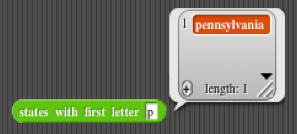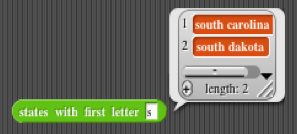
You've probably played Geography, the game in which one player says
a place name and the next player has to name another place whose first
letter is the last letter of the previous place: Newark, Kentucky,
Yonkers, San Francisco, Oklahoma. Have you ever gotten stuck on the
letter "A"? Oklahoma, Alabama, Asia, Alaska, America, Alameda... and so
on, forever.

Now we want to select a subset of the states, namely the ones whose
first and last letters are the same. Here's the block we use for that:

Like map, the keep block has a function as its first input.
Notice, though, that this grey ring's inner boundary is hexagonal.
This lets you know that you should use a predicate function,
which means a function that reports true or false.

The first letter of a word is letter number 1:
![(LETTER (1) OF []) (LETTER (1) OF [])](/~cs10/labs/img/list/hof/firstletterblock.png)
(Note that we've deleted the word "world" that Snap! provides as a default
value, a hint about what kind of input is expected. The input slot must
be empty for our function-input notation to work.)
Finding the last letter is a little trickier; you find the length of
the text and use that number to select which letter you want:
![(LETTER (LENGTH OF []) OF []) (LETTER (LENGTH OF []) OF [])](/~cs10/labs/img/list/hof/lastletterblock.png)
Putting all these pieces together will give us the answer we want:

But if you're playing Geography, the question you really want answered is
"Which states start with such-and-such a letter?" You can define a block
that takes a letter as input and gives the answer to that question:



Try this:
Write an expression that will select all the words of at least
five letters from a list. For example, if the words in the list are being,
for, the, benefit, of, mister, and kite,
then your block should choose the words being, benefit, and mister.
Write an expression that takes a list of mixed words and numbers, and selects just the numbers,
(Hint: Look for is in the Operators palette.)
Write an expression that selects from a list of words the ones that start with a vowel.
(Hint: Use contains in the Variables palette.)